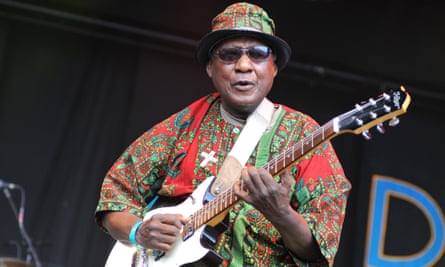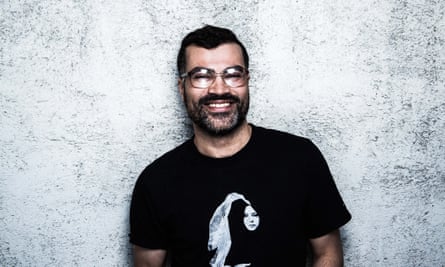The UK has long been a leading destination for discovering sounds from far-flung corners of the globe, whether it is Malian songbird Oumou Sangaré’s set at Glastonbury, or the shadowy South African electro of DJ Lag in a sticky-floored club in London. But last weekend, that reputation was thrown into disarray following comments by Womad organiser Chris Smith, who lambasted the UK’s oppressive visa restrictions on world music artists. Three of the acts scheduled for the festival – Sabry Mosbah from Tunisia, Wazimbo from Mozambique and some of the members of Niger’s Tal National – were denied entry to the UK and either had to cancel their festival appearance or perform stripped-down sets. Indian duo Hashmat Sultana passed through border control 24 hours after they were due to go on stage. Smith said that an increasing number of performers were now declining invitations to the event because they deemed the Home Office’s iron-fisted process humiliating.
Questions have been raised about what this means for the future of world music in the UK. The festival’s co-founder, Peter Gabriel, this week released a statement calling the situation “alarming” and asked: “Do we really want a white-breaded, Brexited flatland? A country that is losing the will to welcome the world?” Channel 4 News’s Jon Snow, meanwhile, tweeted: “The ‘hostile environment’ took its toll at Womad … a number of events were seriously affected by visa refusals. By definition, a festival of world music requires visas for many bands. What on Earth is the Home Office doing refusing them? Is music the new enemy?”
From booking agents and gig promoters to festival curators and artists themselves, many have had disheartening experiences trying to bring esteemed musicians into the country. Each time, they must navigate a confusing matrix of box-ticking processes via outsourced application centres only for a visa to be refused regardless, causing gigs to be cancelled at the last minute and money lost.
“It’s definitely the toughest country to enter,” says Ben Makkes, manager for the 82-year-old Ghanaian highlife pioneer Ebo Taylor, denied a visa last year despite playing in the UK many times during his 60-year career. During his application, the visa office kept his band’s passports for weeks, meaning they couldn’t travel elsewhere in Europe, missing vital shows. “There was no communication, no help whatsoever,” says Makkes. “The reason they eventually gave us was insufficient funds on accounts, even though my company had stated that we would cover all costs. In the end we lost €20,000 (£17,000) in flights and fees, and I don’t think we’ll come back to the UK because of that.”

That despair is reiterated by many artists abroad. The Serbian DJ Tijana T told dance music site Resident Advisor she felt “like a criminal” after having her UK visa denied three times last year. Booking agent Clementine Bunel agrees that artists find it “demoralising”, while Seun Kuti, son of Afrobeat legend Fela, said on the BBC’s Victoria Derbyshire show last week: “What we musicians go through is hell”.
The UK visa process for entertainers does indeed sound like a gift from Satan himself. It is eye-wateringly complex, costly (£245 slow-track; much more for premium fast-track) and certainly not user-friendly. Steve Richard, of entertainment specialists T&S Immigration Services, explains that applicants must fill out an online form, containing sections that are “not entirely clear”, followed by a personal appearance at a visa application centre. “Some people will live near a VAC but many won’t, particularly in Africa,” says Richard. “Applicants from Mali, for example, have to travel to Dakar in Senegal for their nearest VAC”, and trips such as these, which can be about 1,000 miles each way, for 15 band members can cost several thousand pounds.
“It’s an absolute scandal,” says Paul Duhaney, director of Liverpool’s annual Africa Oyé festival. “It’s like me having to go to the USA, but going to Moscow to get my visa. I just wouldn’t do it. So why are we expecting African artists, or artists from anywhere for that matter, to go to another country for interviews?”
Performers invited by a number of approved events such as Womad (there are 45 in the UK in total) can apply for a permit-free festival visitor visa without the need to issue a certificate of sponsorship. But they must “provide bank statements showing a consistent balance of around £1,000 for at least three months,” says Richard. Even these visas are clearly no longer guaranteed, often due, according to David Jones, a director at live music producer Serious, to spiralling processing times. “What used to be the absolute maximum period they would turn the visa around in, 15 working days, has become the norm.” Often this means that passports are returned long after a gig has taken place.
The Home Office told the Guardian that “in the year ending December 2017, 99% of non-settlement visa applications were processed within 15 days and the average processing time in 2017 was just under eight days”.

According to Richard, visa officers “don’t always appreciate that the simple fact an artist is popular in the UK is reason enough that they should want to do a show here”. Duhaney agrees: many of these bands have “played to 40,000 people in their own country. It’s like Robbie Williams going to Ghana and they’re saying: ‘Who are you? Not really sure we can let you in, mate.’” These refusals seem to be more common than ever in the past year, adds Richard. And it is taking its toll on event programming.
“We have four bands on reserve just in case of last-minute visa issues, because it happens every year. It’ll happen in the years going forward,” says Duhaney. “This could seriously affect all UK festivals, if this continues.”
Alison Phipps, a language professor at Glasgow University and a Unesco chair in refugee integration, says: “It is an extraordinarily difficult thing to bring a musician into the country,” and that “undoubtedly, since 2015, it has got considerably harder”. In 2017, she booked 22 musicians and dancers from Ghana to perform as part of a £2m UK government-funded academic project at Solas festival. At first, 20 were denied visas. “We’ve done this in the past and we’ve never had a problem,” says Phipps, but this time “they received letters and refusals saying that the Home Office did not believe that they were musicians, that they were working with me on this project. We’re funded by the government to do this work, and then the same government refuses us permission to do it.”
After appealing, with the help of her local MPs, all but two of Phipps’s invitees were let in. But not before flights had been rebooked for thousands of pounds. Whether it is official or not, Phipps says, “there is a travel ban in place in the UK. What I see constantly is that if you are from the global south, you will be refused almost invariably.”
Brian d’Souza, who performs as the musician Auntie Flo, met one of the key collaborators on his next album, Senegal’s Mame n’Diack Seck Thiam, while in Amsterdam. One of their tracks, Mame’s Story, details Seck Thiam’s difficulties getting a visa to perform at a BBC World Service event at the 2017 Edinburgh International festival.
“There seems to be a very colonialist attitude when it comes to presuming underlying motivations for the artists I’m trying to book,” says d’Souza. “It’s saying: ‘If they come to the UK, they’ll just end up staying.’ But most of the artists I’ve ever worked with are here to do a job, and then they’re quite happy to go back to their own homes; they’re not desperate to come and live in the UK. They are performers, they’re not trying to emigrate.” Examples such as the nine members of the Orchestra of Syrian Musicians, granted asylum in 2017, are in a minority. Most musicians’ work is rooted in where they live, and they have no desire to move – something underlined by often decades of touring without any attempt at illegal immigration.

Was Jon Snow right, then, when he said that the hostile environment is in effect for touring musicians? “Perhaps, but it’s hard to say this is deliberate,” says Richard. “From how we see it, most of these problems seem to stem from their processes not working very efficiently.” Jones also suggests that it is down to administrative incompetence, as a result of cost-cutting. “I don’t think there’s someone sitting inside the immigration authority who’s going: ‘Let’s be racist,’” says Jones. “But instead of being a system that isn’t quite working in the face of government cutbacks, and it’s just bumbling inefficiency and a nuisance, it’s become something that’s been perceived in a different light. Because of Brexit and belligerent statements about ‘reclaiming our borders’. Really, this process has been eroding over time.”
Brexit rhetoric might not help Britain’s image as a cultural nexus. But how it will exacerbate the current climate for touring musicians – as well as artists of all other kinds – remains to be seen. Richard says it is unlikely to affect those from countries already on the visa list, but what about those from the EU? A recent report published on 26 July by the House of Lords’ European committee about the movement of people in the cultural sector suggested that the government should offer a “multi-country, multi-entry, short-term touring visa for EU citizens,” and vice versa. But changes have already started to come into play on some borders – and without warning. American artists who would once fly to Ireland to play shows and then go on to the UK without an entry visa now require one to enter the UK, says Richard, “whereas if they enter from any other country, they just need a paper permission, not a visa”.
What it could mean for the future, he continues, is that “non-EU acts are less likely to play shows in Ireland. Bands may deem that slotting a Dublin show into their tour is too troublesome.”
The irony is, says Bunel – who has worked with breakthrough African artists such as Songhoy Blues and Orchestra Baobab in the UK – all this is happening at a time when music that is not American or British is the most popular it has ever been. “There’s much more of a hunger for this kind of music since Brexit [was announced] and a big push from the media to champion those artists. It’s just a shame that as one door is opening, another one is closing.”

While Jones estimates that fewer tours are likely to be undertaken in the UK by artists needing visas, he says that he won’t be discouraged from booking them. “That sense of keeping international links wide open has never felt more important in my lifetime.” He says a solution would be simply to “trust” the festivals on the permit-free list who have signed up to take responsibility for the artists they have invited to Britain. Others suggest a specialist for the entertainment sector within the Home Office who can distinguish between genuine and non-genuine acts, and an independent organisation who can advise on forms.
If the current situation is not reviewed and improved, however, “everything is going to get a lot harder”, says Phipps. “The UK will be isolated.” Artists, she says, “bring us in to a relationship with difference. They play a line of music we’ve not heard before and we welcome it and our lives are enriched – and then we begin to learn it and then we sing it. What we are doing with Brexit, with the closing of the borders, with all of this focus on a hostile environment, is trying to make our lives dull and stupid.”
